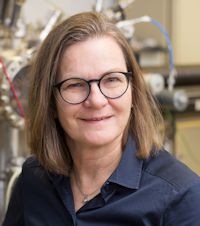 Ulrike Diebold received her PhD degree in engineering physics in 1990 from the University of Technology (TU Wien) in Vienna, Austria. After working as a post-doc with Prof. Ted Madey at Rutgers University in New Jersey, she joined the faculty at Tulane University, New Orleans, U.S.A. In 2010 she returned to her alma mater, where she currently holds a full professorship at the Institute of Applied Physics. Diebold has published more than 200 peer-reviewed articles, and has given over 300 invited talks. Her articles have been cited more than 20,000 times. She has been elected Fellow of AVS, APS, and AAAS, and is a member of the Austrian, German, and European Academies of Sciences.
Ulrike Diebold received her PhD degree in engineering physics in 1990 from the University of Technology (TU Wien) in Vienna, Austria. After working as a post-doc with Prof. Ted Madey at Rutgers University in New Jersey, she joined the faculty at Tulane University, New Orleans, U.S.A. In 2010 she returned to her alma mater, where she currently holds a full professorship at the Institute of Applied Physics. Diebold has published more than 200 peer-reviewed articles, and has given over 300 invited talks. Her articles have been cited more than 20,000 times. She has been elected Fellow of AVS, APS, and AAAS, and is a member of the Austrian, German, and European Academies of Sciences.She is also a recipient of several international awards, including an Advanced Research Grant from the European Research Council (ERC), the Adamson Award of the American Chemical Society, and the Wittgenstein Prize, the highest research award in Austria.
Diebold conducts research in experimental surface science with an emphasis on metal oxide surfaces. She is particularly interested in the atomic-scale properties of these complex materials, and in unraveling their (defect)structure/reactivity relationship. The main tool, Scanning Probe Microscopy, is complemented by area-averaging surface spectroscopies and first-principles calculations.

